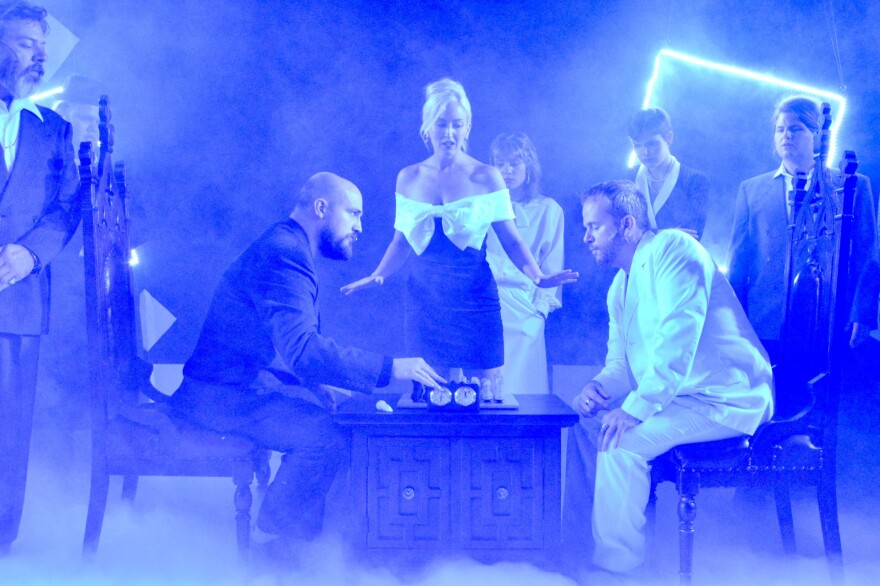The GhostLight Theatre in Benton Harbor recently opened its production of the musical Chess. WMUK’s Gordon Bolar has this review.
Any theatre producing Chess, the 1980’s creation by members of ABBA and lyricist Tim Rice, must deal with a number of challenges. These include a formidable musical score, operatic arias and recitative, and a complex storyline that pits lovers against one another as pawns of cold-war superpowers. The fluid staging necessitates quick set changes ranging from a Bangkok street to a grand hotel room in Budapest. Twenty-one performers and a small orchestra are required.
Despite The GhostLight’s sterling record, it’s still surprising that this company in a small black box theatre in the arts district of Benton Harbor has mounted a "monster” of a musical with such success.

This two hour and fifty-minute show is a visual and aural assault on the senses. Augmented by Paige Mulick’s stimulating choreography, Collin Wagner’s atmospheric smoke-infused lighting design, and appropriately pitched on the checkered squares of a chess gameboard, director Paul Mow’s production pulls out all the stops to deliver a stunning piece of musical theatre.
The ending leaves its appreciative audience exhilarated, nearly overwhelmed, and still wanting more, as they survey a devastated landscape of broken dreams and crushed souls in the wake of cynical machinations by the United States and the former Soviet Union.
The story is set around a highly publicized chess tournament match, with international political implications. The opponents are Anatoly Sergievsky and Freddie Trumper. These characters are loosely modeled on past Soviet Chess Grandmasters and American Grandmaster Bobby Fischer.
Dan Maxon, as Anatoly, presents a complex, sympathetic character torn between a newly found love interest, and ties to his former family in Moscow. We first see Anatoly reflecting on his place atop the chess world. While Maxon’s soaring tenor in “Where I Want to Be” lifts us with him to his lofty perch, his demeanor and tone belie a longing for something else in life.
That something is manifested in the character of Florence, played by Julie Peterson, Freddie’s energetic, charming assistant. Peterson pulls heartstrings as she too expresses a desire for something more than an argumentative relationship with Freddie, in “Someone Else’s Story.”
True to her aspirations Florence soon falls in love with Freddie’s Soviet opponent, Anatoly. Their relationship is cemented with a kiss and the seeming promise of a mutual future in the “Terrace Duet,” beautifully rendered by Maxon and soprano Peterson.
Meanwhile, actor Michael Finchum, brings the mercurial, immature, and petulant genius of Freddie to vivid life in the hedonistic romp, “One Night in Bangkok,” the best-known song from Chess. Here through his animated vocal delivery, Finchum shows his commitment to this frenetic character, although the performer sometimes strains at the top end of his range.
Less appealing from a musical and character revealing standpoint is Freddie’s self-absorbed “Pity the Child.” This and a few other numbers in Act II, including “I Know Him so Well” between Florence and Anatoly’s ex-wife, Svetlana seem extraneous to the storyline.
While Anatoly and Freddie create interest with their shortcomings, foibles, and weaknesses, others on their respective supporting teams also present characters who hold our attention as the larger international game of espionage and diplomacy plays out.
KGB agent Molokov, played with sinister intent by Jarad Medukas, and Michael Riggenbach as Freddies’ deal making, smooth talking, American agent, hatch a Machiavellian plan to elevate their own status and advance their interests with “Lets’ Work Together.”
Standouts in the gifted supporting ensemble include Seth Martin who plays violin in the small orchestra and assumes a number of carefully crafted supporting roles throughout.
One of the show’s highlights is provided by Julie Peterson and Dan Maxon in a heart-rending review of their relationship in the duet reprise of the song “You and I.”
Peterson then takes stage for the Finale, a gut-wrenching, defiant inventory of all that Florence has lost in this intricate dance of black and white, now tinted with shades of grey. She touches on the key question that lingers beyond the show’s final curtain. Where should one’s loyalty lie? With country, love, or the players in the game around her?
As I left the theatre Friday evening, I reflected on the summit negotiations held in the late nineteen eighties, preceding the fall of the Soviet Union, during the time when Chess was set.
Beyond the chess board, the players included Ronald Reagan and Mikhail Gorbachev. I couldn’t help but note this show’s startling and simultaneous relevance to current negotiations between the United States and Russia in Alaska. The names of the leaders have changed, of course. The game, however, continues. As does this show through August 24th.

